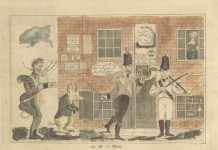 From scanning technology to the promise of inter-book linking to the insanity behind the anti-Net Sonny Bono Copyright Term Extension Act, writer Kevin Kelly masterfully surveys the digital library scene.
From scanning technology to the promise of inter-book linking to the insanity behind the anti-Net Sonny Bono Copyright Term Extension Act, writer Kevin Kelly masterfully surveys the digital library scene.
But of all the statistics in Kelly’s New York Times Magazine piece, it’s the China-related ones that impressed me the most:
Like many other functions in our global economy…the real work has been happening far away, while we sleep. We are outsourcing the scanning of the universal library. Superstar, an entrepreneurial company based in Beijing, has scanned every book from 900 university libraries in China. [A May 14 correction says the actual number is 200–libraries of all kinds, not merely the university variety.] It has already digitized 1.3 million unique titles in Chinese, which it estimates is about half of all the books published in the Chinese language since 1949. It costs $30 to scan a book at Stanford but only $10 in China.
Is there any mystery why China, not the United States, is the true E-Book Central, or at least is on the cusp of being it? I’d love to know the terms under which the 1.3 million titles are being released in digital format. How many are free? I suspect most–a stark contrast to the situation here in the backwards United States, where Hollywood’s copyright concerns prevail over culture, including the preservation of orphaned works. I favor ample protections for authors and heirs, but haven’t we gone overboard with life+70 for writers and 95 years for corporately authored works. Sample from Kelly’s Bono-related observations:
…when Congress voted in 1998 to extend copyright an additional 70 years beyond the life span of a creator—to a point where it could not possibly serve its original purpose as an incentive to keep that creator working–it was obvious to all that copyright now existed primarily to protect a threatened business model. And because Congress at the same time tacked a 20-year extension onto all existing copyrights, nothing–no published creative works of any type–will fall out of protection and return to the public domain until 2019. Almost everything created today will not return to the commons until the next century. Thus the stream of shared material that anyone can improve (think “A Thousand and One Nights” or “Amazing Grace” or “Beauty and the Beast”) will largely dry up.
In the world of books, the indefinite extension of copyright has had a perverse effect. It has created a vast collection of works that have been abandoned by publishers, a continent of books left permanently in the dark. In most cases, the original publisher simply doesn’t find it profitable to keep these books in print. In other cases, the publishing company doesn’t know whether it even owns the work, since author contracts in the past were not as explicit as they are now. The size of this abandoned library is shocking: about 75 percent of all books in the world’s libraries are orphaned. Only about 15 percent of all books are in the public domain. A luckier 10 percent are still in print. The rest, the bulk of our universal library, is dark.
This article should be required reading for politicians and political candidates, especially former Democratic vice presidential nominee John Edwards, the one I’ve been working on, given (1) all his talk about being pro-education, (2) his past membership on a copyright-related Senate Judiciary Committee and (3) our both having gone to UNC, which, ironically, is home to the servers of Project Gutenberg.
Type “John Edwards copyright” into Google, and you’ll see mention of TeleRead’s comments near the top. The longer he remains so stubbornly mute on copyright extension, the more Google listings to document this.
I encourage you to choose your own target and ask, “When are you going to speak up against the Sonny Bono Copyight Term Extension Act?” I think it’s high time for Netfolks to say: “Take a stand against Bono, or we won’t campaign so energetically for you online.” Is it possible that the people behind MoveOn, which has served liberal candidates’ campaigns so well as an organizing tool, could speak out? Same for conservative equivalents. Just as when it was passed by a Republican Congress and signed by Democratic President Bill Clinton, copyright-term extension remains a bipartisan issue that should transcend ideology and party alike.
Related: MPAA-RIAA-owned Orrin Hatch is target of challenger for Senate seat. Yes, Pete Ashdown is anti-Bono. Hello, John Edwards? I don’t care so much about your past Hollywood contributions as about your future willingness to speak up for better copyright laws for schools and libraries. I believe in redemption and hope you’ll stop staying so bloody mute. You’d make your fan Larry Lessig very happy.
(First spotted via Roger Sperberg. Thanks, Roger!)


































[…] A universal library – such spectacular achievement is now possible Kevin Kelly paints <free registration> a glorious picture of the ultimate library, already being created in a way. And he reminds us of the type of crowning achievement it would be for the human race. "The dream is an old one: to have in one place all knowledge, past and present. All books, all documents, all conceptual works, in all languages. It is a familiar hope, in part because long ago we briefly built such a library. The great library at Alexandria, constructed around 300 B.C., was designed to hold all the scrolls circulating in the known world. At one time or another, the library held about half a million scrolls, estimated to have been between 30 and 70 percent of all books in existence then. But even before this great library was lost, the moment when all knowledge could be housed in a single building had passed. Since then, the constant expansion of information has overwhelmed our capacity to contain it. For 2,000 years, the universal library, together with other perennial longings like invisibility cloaks, antigravity shoes and paperless offices, has been a mythical dream that kept receding further into the infinite future." He goes on to talk about how, for example, Google’s scanning initiative and the technology currently available starts to make such an amazing feat seem actually within our grasps. If all the stars align, that is, so that DRM and IP law and other obstacles don’t get in the way. The great library at Alexandria may have been destroyed by fire. What will stop us from another great universal library? Can it happen? Will it happen? I hope so, but I think it’s a long shot. The good news is that every step forward is an exciting development, and e-books and technology advancements are bringing amazing opportunities… like Project Gutenberg. It’s a wonderful time to be an (e-)book lover! Via TeleRead and NY Times. […]
Kelly’s is a marvellous article. If you’re going to read one essay on the future of the e-book this year, this should be it.